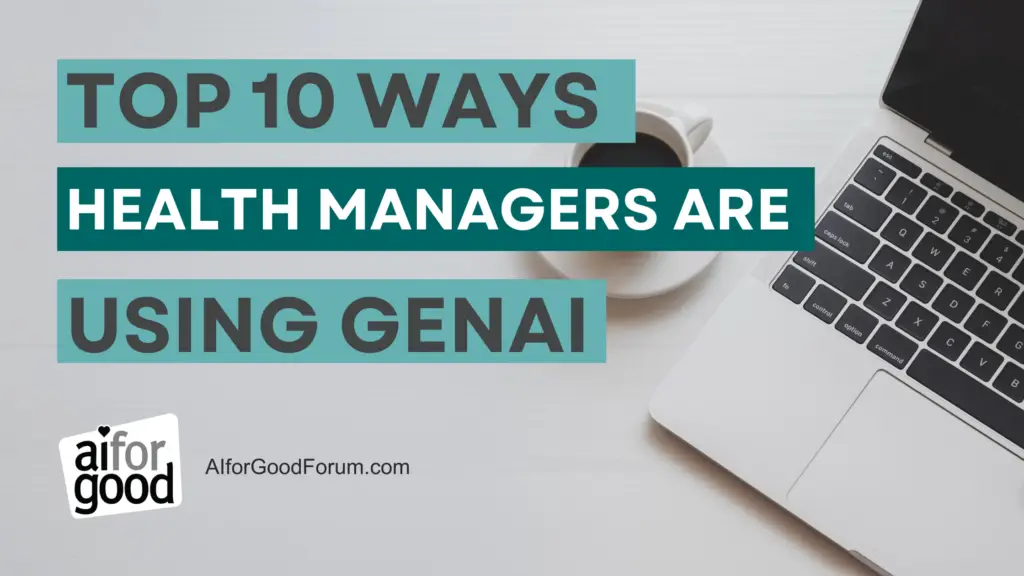Ever wonder how Medical and Health Services Managers are using AI to optimize healthcare operations, manage change, and improve patient outcomes? Drawing from Anthropic’s new Economic Index—fueled by anonymized data from Claude.ai—AI for Good Forum offers a glimpse into how health administration professionals are leveraging AI for real-world results.
Check out our last article on how human resource managers are using AI.
Top 10 Ways Fitness Training Managers Are Actually Using AI for.
-
Financial Operations & Budgeting
From accounting to setting service rates, AI-driven platforms help automate financial reporting and provide data-driven insights on cost allocation, revenue streams, and expenditure patterns.
✅ Example: Use ChatGPT to analyze historical spending and reimbursement data, then forecast operational budgets for the next fiscal year.
-
Supervising & Evaluating Personnel
AI tools can track staff performance across medical, technical, and administrative roles, freeing managers to focus on leadership and strategic human resource allocation.
✅ Example: Prompt Claude to generate staff performance reports, highlighting areas where coaching or additional training could improve patient care outcomes.
-
Reviewing & Analyzing Facility Activities
By analyzing patient flow, resource usage, and service data, AI helps pinpoint operational bottlenecks, improve cash management, and enhance service utilization.
✅ Example: Use Microsoft Copilot to aggregate patient volume data from different departments and recommend ways to reduce wait times and optimize staffing.
-
Program Planning & Implementation
AI assists in designing and administering programs that involve personnel coordination, training plans, and collaborative strategies among medical, nursing, and facility staff.
✅ Example: Ask Google Gemini to map out a timeline for launching a new telehealth service, complete with staff training modules and patient outreach campaigns.
-
Recruitment, Hiring & Training
From scanning resumes for qualified candidates to customizing onboarding schedules, AI streamlines the entire talent acquisition and development process.
✅ Example: Let an AI-driven applicant tracking system rank nurse candidates based on specific certifications, years of experience, and cultural fit.
-
Staying Current with Medical Advancements & Regulations
AI-powered news feeds and compliance tools keep managers updated on the latest medical technologies, government regulations, and insurance changes—ensuring that facilities remain agile.
✅ Example: Prompt Claude to compile key updates on health policy changes, summarizing any potential impacts on billing or service delivery.
-
Monitoring Resource Utilization
AI monitors inpatient beds, diagnostic services, and staff levels, helping managers fine-tune resources, forecast equipment needs, and maintain quality patient care.
✅ Example: Deploy an AI dashboard that flags near-capacity bed usage or limited staffing hours, prompting timely adjustments or reassignments.
-
Computerized Record Management
AI-enabled systems store and analyze personnel data, patient information, and operational metrics, producing actionable insights to guide administrative decisions.
✅ Example: Use an AI-powered EHR platform to cross-reference patient demographics with staff workloads, creating more balanced scheduling.
-
Managing Change & Technological Innovations
Healthcare shifts rapidly. AI helps plan for tech rollouts (like new EMR systems) and restructuring initiatives, guiding smooth transitions without disrupting patient care.
✅ Example: Ask ChatGPT to outline a phased approach for implementing a new digital lab results system, including staff training and risk mitigation steps.
-
Developing & Implementing Policies & Procedures
From regulatory compliance to infection control protocols, AI aids in reviewing, drafting, and updating operational guidelines that align with best practices and industry standards.
✅ Example: Prompt Claude to assess your current workplace safety protocols against the latest CDC guidelines, suggesting policy updates where necessary.
Why More Medical & Health Services Managers Need to Embrace AI
Medical and Health Services Managers who adopt AI can streamline essential tasks—from budgeting to resource allocation—and stay ahead of emerging healthcare trends. AI not only boosts operational efficiency and cost-effectiveness, but also improves patient outcomes and staff satisfaction.
Try This Medical & Health Services Manager AI Prompt!
“Act as a healthcare operations consultant. Assess our current staffing model and identify two critical areas where hiring or scheduling changes would improve patient flow. Include projected cost savings and potential impacts on patient satisfaction.”
Want more Medical & Health Services Manager-specific AI prompts?
Request access to our exclusive AI Prompt Library!

